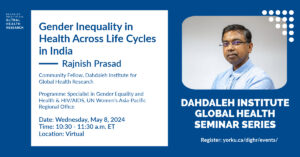Post
Published on June 27, 2024

On May 8, 2024, Dahdaleh community scholar Dr. Rajnish Ranjan Prasad presented an in-depth analysis of gender health inequities in India and its root causes. He began with an overview of gender health disparities that starts even before birth, highlighting the practice of sex-selective abortions and the resulting imbalance in the sex ratio at birth.
Dr. Prasad noted that infant mortality rates have declined overall. Yet, significant health disparities remain between males and females. Beginning from birth, there are biases in post-birth care and nutrition, with female infants receiving less medical attention. This issue is particularly more pronounced in rural areas and among less educated mothers. Later in life, poor nutrition and social norms that deprioritize female health, results in higher prevalence of anemia among adolescent girls and women, in the age-group of 15 to 49 years. Anemia significantly impacts educational outcomes as well as maternal health, being a leading cause of maternal mortality due to postpartum hemorrhage.
Following, Dr. Prasad discussed the taboo surrounding menstruation in India. Specifically, he elaborated upon the significant variation in menstrual hygiene management practices between urban and rural areas and the impact of inadequate menstrual facilities on girls' education. Lack of clean water and sanitation in schools often leads to absenteeism among menstruating girls. Additionally, early marriages can result in educational dropouts, early pregnancies, and associated health risks for young mothers and their children. Education was identified as a critical factor in delaying marriage and improving health outcomes.
The seminar concluded with a discussion on broader social determinants of health, such as women's employment, financial independence, and access to resources like mobile phones. Dr. Prasad emphasized the need for holistic approaches to address gender norms and empower women to make informed health decisions. He provided examples of successful initiatives, such as conditional cash transfer schemes and community participation programs, which have improved health outcomes for women and girls. However, he stressed that significant challenges remain, particularly in addressing deeply rooted gender norms and ensuring equitable access to health services across diverse regions in India.
Watch the seminar presentation below:
Connect with Dr. Rajnish Ranjan Prasad
Themes | Global Health & Humanitarianism |
Status | Active |
Related Work |
N/A
|
Updates |
N/A
|
People |
You may also be interested in...
Recap — Research Exploration: Taking a Critical Social Science Approach to Global Health Research
The Dahdaleh Institute held its fourth annual Critical Social Science Perspectives in Global Health Research Workshop (CPGH) as a hybrid event on Wednesday, March 29, 2023. This year, over 30 researchers participated to discuss the ...Read more about this Post
New book explores catastrophe and the making of the normal state
As the world reels from catastrophes on multiple fronts, a recent book by Osgoode Hall Law School Associate Professor Saptarishi Bandopadhyay is redefining the role and meanings of disaster in relation to statecraft, says York University’s associate ...Read more about this Post
Recap — Living in a Global Hinge Moment: Thinking Critically About Global Crises, with Saptarishi Bandopadhyay
On September 18, 2024, Dahdaleh faculty fellow and Associate Professor at York University Saptarishi Bandopadhyay explored whether current global crises represent a pivotal moment in history. Professor Bandopadhyay was hesitant to answer definitively due to ...Read more about this Post


